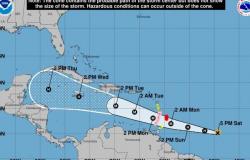A moment of inner silence to find calm. That’s how it is praying, the act of talking to God and focusing one’s energies on his teachings which, for many people, is liberating, comforting and can provide a respite in the middle of a chaotic day.
Something similar happens when meditating: Taking away the religious factor, those who perform this practice also find a feeling of peace and balance, connecting the mind with the body.
But, Have you ever wondered what’s going on with your brain while you are praying or meditating? Why do we feel such a deep connection with God or ourselves? All this is what different experts in neuroscience explained.
When a person prays, he usually repeats a specific prayer—such as the Our father or the Ave Maria– and again. This is what neuroscientist Andres Newberg of Thomas Jefferson University measured using magnetic resonance imaging.
That’s how he found that When praying, “one of the areas of the brain that is activated is the frontal lobe,” He told her BBC. This part performs the function of concentrating, so it is not unusual for it to be activated when praying.
However, the expert was surprised when he found that When a “deep prayer” is prayed, when the person feels that the prayer is almost taking over them, the activity of the frontal lobe decreases. This occurs when the individual reports feeling that they are not the ones generating the experience, but rather that it is a foreign experience that is happening to them.”
That is to say, The brain believes it is experiencing an external sensation, like feeling ‘the presence of God’, and a deep connection, something that many believers report when they focus on their prayers.
On the other hand, praying also reduces the activity of the parietal lobe, another part of our brain that allows us to sensorially perceive our body and creates a visual representation of what it is like.
But, Does the same thing happen when praying as when meditating? According to Tessa Watt, meditation and mindfulness specialist, Yes, you can achieve that state of connection and depth. And they would be practices with very similar goals.
“I believe that both prayer and mindfulness help calm a person, so that she has more time for herself and also activates the parasympathetic nervous system,” said the expert. The latter is the system that helps slow down the heart, dilate blood vessels and relax muscles, among other things.
According to neuroscientist Newberg, Not only does meditation provoke the same reactions that occur in the brain when praying. This can also happen with other activities.like when musicians start improvising.
This, as explained to the BBCwould show that “Creativity can be a deeply spiritual practice for many people, whether they have a religious life or not. And I think they are related, because the brain doesn’t have an area designated just for religion.”
That is, our brain is stimulated in the same areas when we pray, meditate or listen to Beethoven’s Ninth Symphony.
All of these activities, and perhaps many more that have not yet been studied, make humans feel a deep connection with something, be it God, music, or ourselves.






